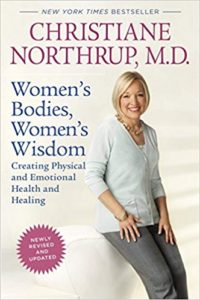
Women’s hormones and the road to happiness
Hormones and habits have a direct effect on our happiness. And we have the power to alter them. Hormones are chemicals in the body that have a profound effect on behavior, mood, and health. Our hormones react to the stress we’re feeling. At the same time, our bodies react to changing hormones.
In her book, “The Wisdom of Menopause,” Dr. Christiane Northrup describes our hormones and emotions as an inner guidance system steering us towards the life we want to create, which may entail the need to make changes in the way we are living now. Our emotions, sometimes fueled by our hormones, serve as alert signals. When emotions result from hormonal changes, we shouldn’t immediately dismiss them. They carry important messages for us.

Northrup maintains that until midlife, women’s hormones encourage her to focus on others. But there are two to three days each month where the “veil” between the conscious and unconscious selves is thinner and the voice of the soul is clearer, reminding us of our own needs and passions. Our intuition is stronger when our estrogen is low and our progesterone is high. Studies have shown the connection between hormonal levels and the focus on our inner vs. outer worlds.
The average woman has about 480 menstrual periods. That’s about 480 opportunities to be guided towards her future. (Just so you don’t have to do the math, that’s about 40 years’ worth.) As we go through perimenopause, our inner voice gets louder and louder. After menopause, we are much closer to our intuition. It’s time to see perimenopause, which can start early around age 35 or later in our 40s and go more than 10 years, as a developmental stage, a transition where new life and new ways of being unfold.
The changing brain
The brain region associated with intuition undergoes changes during the perimenopausal and menopausal periods (no pun intended!). As a woman goes through this stage, her very biology is begging for quiet time to reflect. We should try to get at least 15 minutes a day of meditation to get in touch with our inner voice, because this is what is directing our future.
The more we practice relaxation techniques such as deep breathing and meditation, the more adaptable our brains become, and it gets easier to come from a place of clarity and calmness. This is due to a process called “neuroplasticity,” where neural wiring conforms to new practices. That’s why it can be so difficult to break unhealthy habits — our brains are literally wired to our habitual ways of being. We need time and patience to change these brain patterns until new practices become healthier default habits.

Embrace the “motion” in emotion
Our emotions can serve as our divining rods. For example, we can ask, “What is underneath my anger?” Usually there is an unmet need there. The word “emotion” has the word “motion” in it; we are meant to use emotions as incentive for motion in our lives. We don’t want to get stuck in them, but we want to examine them to direct us towards what we need. It’s about honoring who we are so that we can live a life in alignment with our soul’s divine purpose. When we judge our emotions instead of just allowing them and letting them go, we end up holding on to them longer than necessary.
It takes practice to skillfully articulate our needs. If we don’t honor our genuine emotions, our bodies may rebel by creating disease. We might ask ourselves, “What is out of balance in my life that needs changing?” The parts of our brains that allow us to feel emotions are also connected to our internal organs, more so than the parts of our brains related to rational thought. Our thoughts and emotions affect our organs, our hormones and every cell in our bodies.
Perception is everything
Our perception of life events is more important for our health than the actual life events. Even if we have habits stemming from our childhoods that make us see the glass as half empty, we can change those habits. A study once found that hotel maids who viewed their work as an opportunity to get vigorous exercise had lower blood pressure and more success with weight loss than those who viewed it as drudgery. This is a perfect example of how perception can affect health.
In any situation, you can choose what to focus on. For example, in sickness, do you want to focus on the symptoms or do something to make you feel better? When you have been wronged, do you want to focus on your victimhood or what you can do to make the world a better place? You are the only one who can decide.
In a nutshell
Do at least 15 minutes of meditation every day to relax and connect with your intuition.
Be a detective and examine the origin of your emotions and use that to find out what your unmet needs are.
Try looking at a situation from a new angle. Sometimes we don’t realize that our habitual ways of being and seeing can be self-limiting.
Be patient and continue to practice the arts of meditation, habit change, and perception flipping. It takes time to change thoughts, rewire the brain, affect our health, and manifest our deepest desires.



